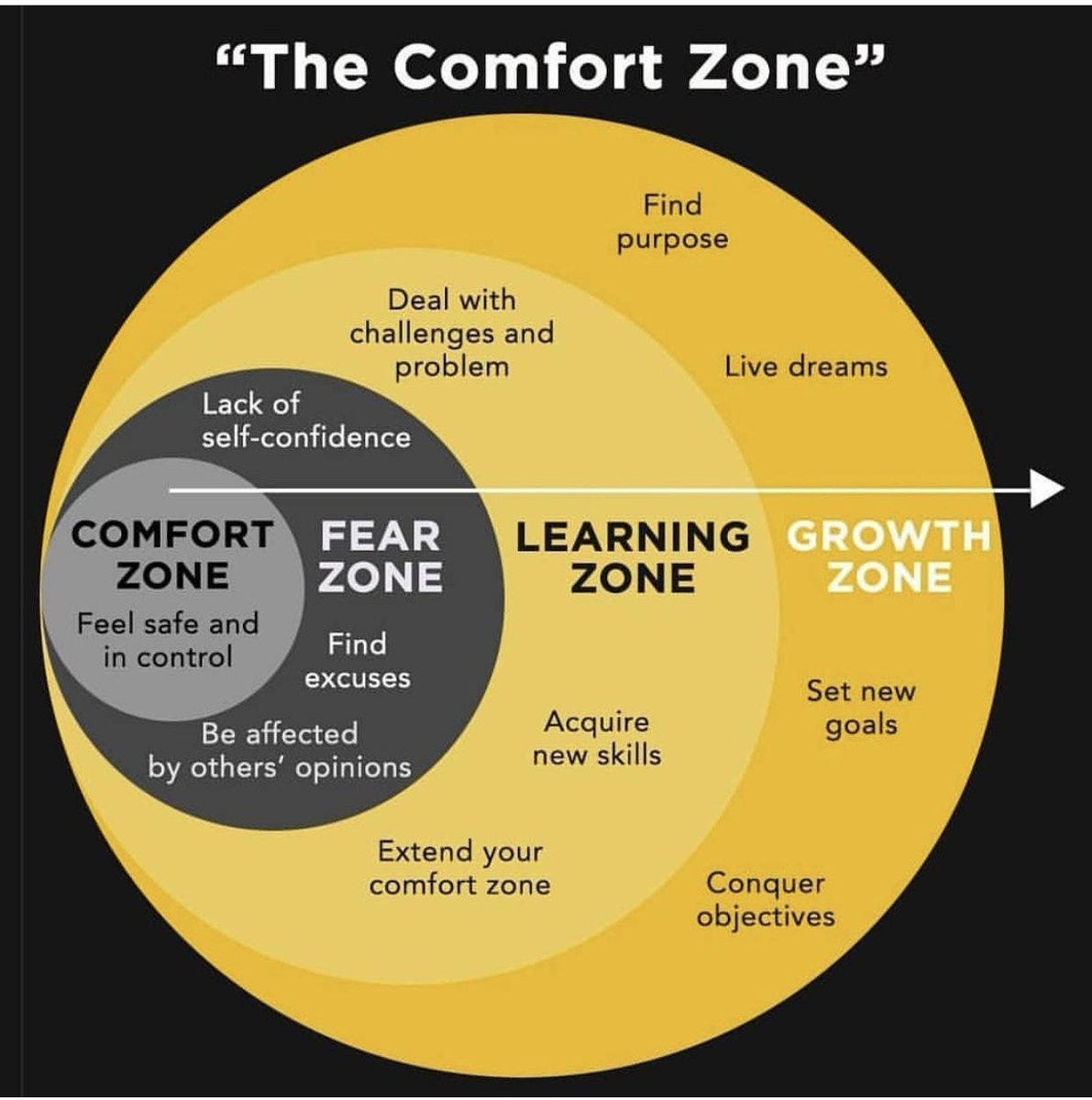
Becoming comfortable in the uncomfortable
People grow in discomfort; they change in pain.
One of the best (and worst) things about the military, is that you are always pushed out of your comfort zone. Postings (how the military moves you around jobs) that enforce job changes, and oftentimes location changes, force you to have a mentality of being able to learn and grow whatever the next challenge. Physical and weapons training requirements force you to continually refine your skills. Promotion from within, always, means you need to pay attention to the roles of others around you. These traits are often undervalued in non-military employers when recruiting veterans. Even more, it is often undervalued in veterans when establishing what they can do when they leave. Regardless of where it is learnt, it is a valuable mindset to have. Military people are great at saying, “I’m not good at that…. yet”. That ‘yet’ is invaluable, it establishes that their potential is not fixed. It might not be easy, but it is possible to grow.
What can you do to nudge right?

This picture shows that to get out of the comfort zone, you have to move through the fear zone. That doesn’t feel natural. You are biologically designed to avoid ‘unsafe things’, to move away from the perception of decreasing safety. You need to protect those things that you value. This makes growth hard. Growth takes doing things that you aren’t good at, and that may scare you a little — or a lot.
Getting past fear
Seriously, what is the worst that could happen. If you look at the graphic you can see the types of things in the fear zone; self-confidence, excuses and opinions. So lets examine these three under the pretence of ‘whats the worst that could happen?’.
Self-confidence — this one is tricky. You do it, and you succeed, your self-confidence will improve. You do it and you fail, you can see that you were right and you should not have tried. Or, you could try it and fail, and realise that you may have not achieved what you set out to do, but you still improved. The difference between these two has nothing to do with trying, and everything to do with what value in yourself you attach to the outcome. The trick here is, do not attach value to the outcome, attach value to working the process and taking confidence from your effort rather than the outcome. After all, you can use the term FAIL as First Attempt In Learning. I tell my children;
You are exactly where you are meant to be, for the level of effort you’ve put in
Excuses — These are the limits you are applying to yourself. Whatever your excuse is, it is only the way you think about yourself. The way you place yourself in your environment, the way you place yourself within your relationships, the way you place yourself in your own personal narrative. You get to choose where you place yourself and there is no ‘worse thing’ to stopping excuses.
Opinions — These. Don’t. Matter. They really don’t. There are lots of adages about opinions. Opinions are like ….. You’ve probably heard at least one. The relative importance you place on other peoples opinions is one of your strongest limitations. It becomes easier as you get older to ignore them. One of the quotes I like the most is;
Don’t take criticism from someone you wouldn’t take advice from
The same goes for opinions, you need to be very select on which opinions you listen to. Not many of them are valuable.
The five-minute challenge
That thing you’ve been putting off, or avoiding, try doing it for just five minutes. I wrote about this in my article on this as a productivity hack, but it will also work for getting through your fear zone.
The thing that’s been playing on your mind, you’ve been thinking about for ages, but are finding it to easy to put off. Just do it for five minutes. Build some discomfort resilience five minutes at a time.
How do you look at Growth?
The other side of your fear is your learning zone, you will spend a lot of time here once you punch through the discomfort. The most important trait of humans, is the ability to connect diverse thoughts, knowledge and experiences into new thoughts, knowledge and experiences. This is growth. You absorb, you create new connections or define new capacities in your brain, you grow.
Carol Dweck’s book “Mindsets” focuses on the importance of developing a Growth mindset. People will often live in the growth mindset in parts of their life and in the fixed in others. Growth mindset is an acknowledgement that you can get better at anything, and a fixed mindset decrees that you have a limit.
How do you look at Growth?
Getting comfortable in the uncomfortable

Moving right, through fear, and into learning to find your Growth Zone. The one trick to this — is to get comfortable being uncomfortable.
Those people that you admire, you look at and really appreciate what they achieve and do. They have worked longer at getting comfortable being uncomfortable. If you want to improve, achieve more, learn something new, fall in love, chase a dream, overcome a fear, set a good example — you need to get uncomfortable. Every time you get uncomfortable you get a little better at it getting uncomfortable. This discomfort is your fear zone being intruded on or pushed through. When you are in your learning zone or your growth zone, your fear zone is still there, still loud.
You are exactly where you are meant to be, for the level of effort you’ve put in
If you want to grow — try to put in some effort in being uncomfortable. Work to spend as much time as you can in the learning and growth zones. Think about the things that make you uncomfortable, the things holding you back from learning or doing something. Then identify one thing you can do to challenge it. Write it down as list, and do one each day – every day.
This may be the most important thing you ever do. Many people focus on the steps to their success, without acknowledging the obstacles along the way. Giving some thought to those obstacles that you create in yourself, and systematically defeating them, will give you the belief that you can learn and do anything. Those things in your fear zone are insignificant once you build the resilience to step into discomfort.
If you want to improve, if you want to be great at something, you need to acknowledge those discomforts and do it anyway. Look at that image, and work out how to push right as often as possible. Sure, recharge in your comfort zone if you need, but then push right again. Grow.
